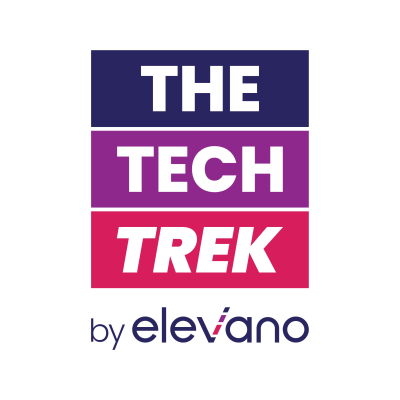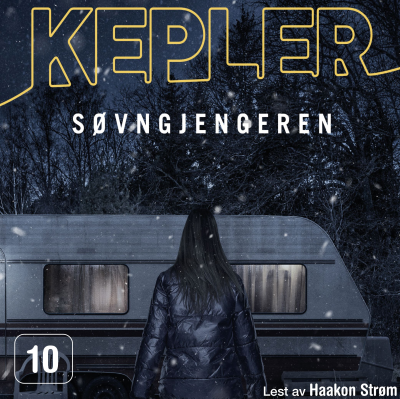
The Tech Trek
engelsk
Business
Prøv gratis i 14 dager
99 kr / Måned etter prøveperioden.Avslutt når som helst.
- 20 timer lydbøker i måneden
- Eksklusive podkaster
- Gratis podkaster
Les mer The Tech Trek
The Tech Trek explores how engineering leaders build teams that deliver real outcomes. The show looks at the connection between people, impact, and technology, and how that relationship is changing fast with data and AI now at the center of every product and company. Hosted by Amir Bormand, founder of Elevano, the show features CTOs, VPs of Engineering, heads of data, and technical leaders who have built and scaled teams in high pressure environments. They share the decisions that shaped their path, the experiments that worked, and the thinking they rely on to stay ahead in a world defined by
Alle episoder
587 EpisoderHow to Pay Down Tech Debt Without Slowing Delivery
Swarupa Mahambrey, Vice President of Software Engineering at The College Board, breaks down what tech debt really looks like in a mission critical environment, and how an engineering mindset can prevent it from quietly choking delivery. She shares a practical operating model for paying down debt without stopping the roadmap, and the cultural habits that make it stick. You will hear how College Board carved out durable space for engineering excellence, how they use testing and automation to protect reliability at scale, and how to make the trade offs between features, simplicity, and user experience without slowing the team to a crawl. Key Takeaways • Tech debt behaves like financial debt, delay the payment and the interest compounds until even simple changes become painful • A permanent allocation of capacity can work, dedicating 20 percent of every sprint to tech debt can reduce support load and improve delivery • Shipping more features can slow you down, simplifying workflows and validating with real usage can increase velocity and reduce tickets • Resilience is not about avoiding every failure, it is about designing for graceful degradation so spikes and outages become small blips instead of crises • Automation is not “extra,” it is part of the definition of done, including unit tests as acceptance criteria and clear code coverage expectations Timestamped Highlights • 00:00 Why tech debt is a mindset problem, not just a backlog problem • 01:00 Tech debt explained with a real example, what happens when a proof of concept becomes production • 03:45 The feature trap, how “powerful” workflows can overwhelm users and explode maintenance costs • 11:03 Engineering Tuesday, one day a week to strengthen foundations, not ship features • 14:39 Stability vs resilience, designing systems that bend instead of shatter • 20:06 Testing and automation at scale, unit tests as a requirement and code coverage guardrails A line worth keeping “If we don’t intentionally carve out space for engineering excellence, the urgent will always crowd out the important.” Practical moves you can steal • Protect a fixed slice of capacity for tech debt, make it part of the operating model, not a one time cleanup • Treat automation as acceptance criteria, no test, no merge, no release • Use pilots and targeted releases to learn early, then iterate based on metrics and real user behavior • Design for graceful degradation with retries, fallback paths, and clear failure visibility Call to action If this episode helped you think differently about tech debt and engineering culture, follow The Tech Trek, leave a quick rating, and share it with one engineer who is fighting fires right now.
Trust but Verify, How to Use AI in Engineering Without Breaking Security
Software is still eating the world, and AI is speeding up the clock. In this episode, Amir talks with Tariq Shaukat, co CEO at Sonar, about what it really takes for non tech companies to build like software companies, without breaking trust, security, or quality. Tariq shares how leaders can treat AI like a serious capability, not a shiny add on, and why clean code, governance, and smart pricing models are becoming board level topics. Key Takeaways • “Every company is a software company” does not mean selling SaaS, it means software is now core to differentiation, even in legacy industries. • The hardest shift is not tools, it is mindset: moving from slow, capital style planning to fast iteration, test, learn, and ship. • AI works best when leaders stay educated and involved, outsourcing the whole strategy is a real risk. • “Trust but verify” needs to be a default posture, especially for code generation, security, and compliance. • Pricing will keep moving toward value aligned consumption models, not simple per seat formulas. Timestamped Highlights • 00:56 What Sonar does, and why clean code is really about security, reliability, and maintainability • 05:36 The Tesla lesson: mechanics commoditize, software becomes the experience people buy • 09:11 Culture plus education: why software capability cannot live in one silo • 14:21 Cutting through AI hype with program discipline and a “trust but verify” mindset • 18:23 Boards, governance, and setting an “acceptable use” policy for AI before something goes wrong • 25:18 How software pricing changes in an AI world, and why Sonar prices by lines of code analyzed A line worth saving: “Define acceptable risk as opposed to no risk.” Pro Tips you can steal • Write down what you want AI to achieve, the steps to get there, and the metric you will use to verify outcomes. • For code generation, scan and review before shipping, treat AI output like a draft, not a final answer. • Set clear rules for what is allowed with AI inside the company, then iterate as you learn. Call to Action If you want more conversations like this on software leadership, AI governance, and building real impact, follow The Tech Trek and subscribe on your favorite podcast app. If someone on your team is wrestling with AI rollout or developer productivity, share this episode with them.
How Great Teams Align Goals That Actually Drive Growth
Gregg Altschul, Vice President of Technology at FanDuel, shares a clear and practical look at how leaders can create real alignment across personal, team, and company goals. He explains why transparency drives trust, how to build a path for growth at every level, and why the best managers help people pursue their long term North Star while still delivering for the business. This is a thoughtful and modern blueprint for tech leadership and team development. Key Takeaways Teams move faster when the company goal is translated into a simple set of objectives that every level can understand and act on. Transparency is the anchor for healthy goal setting and creates the space for honest conversations about career direction. Managers should encourage long term North Star thinking since it keeps people growing even after short term milestones are reached. Succession planning should be an active part of how teams operate so progress never depends on a single person. People can stay committed to their work even if they have long term plans outside the company, and supporting those plans often improves retention. Timestamped Highlights 02:19 How top level business goals get distilled into specific team and personal goals that engineers can act on. 04:57 The role of transparency in helping teams understand the why behind each objective. 07:34 Helping ICs tie personal development to broader company needs while still honoring their ambitions. 09:28 Creating a safe environment for honest career conversations in a world of hybrid and remote work. 15:14 Why knowing a person’s long term plans makes succession planning easier for everyone. 17:45 How Gregg works with his own manager on growth even when the title ladder narrows at the VP level. A standout idea from Gregg “As long as you have a North Star you will grow. Whether you ever reach the exact role you picture is not really the point. The point is growth.” Call to action If this conversation helped you rethink how goals work inside your team, share it with a colleague who will appreciate it. Follow the show so you never miss new episodes and connect with me on LinkedIn for more conversations with leaders shaping the future of engineering and data.
How To Grow From Engineer To CTO And Still Love The Code
Ken Ringdahl, CTO at Emburse, joins The Tech Trek to share what it really looks like to grow from engineer to CTO without losing your love for building. He talks about staying close to the code while leading a three hundred person org, how he learned the business side on the job instead of through an MBA, and why curiosity is still his strongest tool. If you are an engineer who cares about leadership, AI, and long term impact, this one will hit close to home. the-tech-trek_copy-of-ken-ringd… Key takeaways The best engineering leaders stay technical for as long as they can, then pick their spots to lean in where the business needs them most. You can learn the business side on the job by raising your hand for cross functional work and building real relationships with sales, finance, and product leaders. Curiosity is a career advantage, both in technology and in leadership, because the quality of your questions shapes the quality of your decisions. A practical AI strategy comes from listening to customers, partners, and internal experts, then translating that into focused product bets instead of chasing shiny tools. Do not rush into management just for the title, a deep foundation as an engineer will make every future leadership decision stronger. Timestamped highlights 00:38 Ken explains what Emburse does and how modern spend management lives at the intersection of software, data, and finance. the-tech-trek_copy-of-ken-ringd… 01:30 How he balances being an engineer at heart with the reality of leading many teams and products as CTO. 03:41 Ken reflects on missing his coding days, what he still tinkers with, and why he chose the bridge role between tech and business. 08:32 Learning leadership without an MBA, creating your own opportunities, and attaching yourself to people you can learn from across the company. 14:58 How he stays smart on AI through office hours, internal experts, cloud partners, customers, and investor networks. 21:22 His biggest advice for engineers who want to move into leadership and why he actually went back to a more hands on role before moving up again. One line that stayed with me “Even if you want to be a leader, do not rush it. Do not go so fast that you do not get that foundation.” the-tech-trek_copy-of-ken-ringd… Practical moves for your own career Stay technical as long as you can, then choose a few focus areas such as architecture, AI strategy, or cloud patterns where you can still go deep. Use curiosity as your main tool, ask simple but sharp questions of finance, sales, and customers so you see how technology really creates value. Look for chances to run cross functional projects early in your career so that by the time you step into leadership, you already understand how the wider business works. Treat partners, customers, and internal experts as an extended brain trust, especially when you are trying to shape an AI and platform strategy. Listen and stay connected If this episode helped you think differently about your own path from engineer to leader, follow The Tech Trek, leave a rating on your favorite podcast app, and share it with one person on your team. To keep the conversation going, connect with Ken on LinkedIn and find me there as well for more stories from leaders who are building real impact with technology.
Factory operating systems and the AI hardware crunch
Karan Talati, cofounder and CEO at First Resonance, joins me to unpack what modern manufacturing really looks like inside factories that build rockets, drones, reactors, and other complex hardware. We dig into why only a small slice of factories run on real systems today, what a true factory operating system unlocks, and how that connects directly to national security and the AI boom. If you care about where all of this new compute, energy, and defense hardware will actually come from, this conversation gives you a clear view of the stack, the gaps, and the opportunity. Key takeaways • Only a small fraction of factories in the United States use a manufacturing execution system, which leaves a huge gap between legacy on prem tools, paper processes, and generic workflow apps that were never built for hardware work • Cloud infrastructure and open interfaces now make it possible to deploy a purpose built factory operating system at a cost and speed that works for both fast moving startups and long standing suppliers • Reindustrialization does not mean bringing every product back onshore, it means being deliberate about the layers of manufacturing that matter most for national security, chips, optics, and other high value components • The real foundation for modern manufacturing is talent, there is a major chance to re skill people into highly technical, well paid roles in aerospace, semiconductors, energy, and more • AI and agent style workflows will sit across design, manufacturing, and field operations so that hardware teams can close feedback loops, shorten timelines, and make better decisions with the data they already generate Timestamped highlights [00:40] Karan explains what First Resonance does and why he calls it a factory operating system for complex industries like aerospace, defense, energy, and autonomy [01:55] How we ended up with only about fifteen percent of factories running on an MES, and why most hardware work still lives on paper, spreadsheets, and ad hoc tools [06:49] A clear walkthrough of how offshoring looked like a rational path for decades, and why it created hidden risk across chips, optics, and other critical components [11:46] Which parts of manufacturing should come back onshore, why you do not want everything local, and how workforce strategy fits into the new industrial map [16:35] What a horizontal stack across design, factory systems, test, and field data can look like, and how AI agents can keep teams in sync across that stack [23:02] The real timelines of hardware in the age of AI, why software is speeding up physical development, and why examples like SpaceX and TSMC matter for the next decade A line that stayed with me “Hardware and software are not separate worlds, they are one system that is now converging faster than most people realize.” Practical moves for tech leaders • Map your current manufacturing and hardware workflows, even if you are at a software first company, find the paper, spreadsheets, and disconnected tools that support anything physical you ship • Look for one or two places where a factory operating system or modern MES could remove handoffs, for example design changes that take weeks to reach the line or test data that never feeds back into engineering • Treat manufacturing careers as part of your talent strategy, help your teams see these roles as high skill and high impact, not as a side track Call to action If this episode gave you a clearer view of how hardware, AI, and national security tie together, share it with one other person who should be thinking about the factory side of their roadmap. Follow and subscribe to The Tech Trek so you never miss deep dives like this, and connect with me on LinkedIn if you want more conversations at the edge of data, engineering, and real world impact.
Velg abonnementet ditt
Premium
20 timer lydbøker
Eksklusive podkaster
Gratis podkaster
Avslutt når som helst
Prøv gratis i 14 dager
Deretter 99 kr / month
Premium Plus
100 timer lydbøker
Eksklusive podkaster
Gratis podkaster
Avslutt når som helst
Prøv gratis i 14 dager
Deretter 169 kr / month
Prøv gratis i 14 dager. 99 kr / Måned etter prøveperioden. Avslutt når som helst.

































